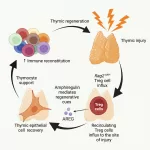A recent meta-analysis published in the journal Nutrients has unveiled promising findings regarding curcumin, a compound found in turmeric, in managing hyperglycemia and inflammation in patients with type 2 diabetes (T2D). This study, which assessed 18 trials involving 1,382 participants, suggests that curcumin supplementation may offer significant benefits in managing the critical health challenges faced by T2D patients.
The analysis found that curcumin supplementation led to a notable decrease in fasting blood glucose levels by approximately 11.48 mg/dL, and a reduction of 0.54% in glycated hemoglobin (HbA1c), both key indicators of blood sugar control in diabetes. Furthermore, curcumin supplementation was shown to significantly reduce C-reactive protein (CRP), a biomarker associated with inflammation, suggesting potential benefits beyond glucose regulation.
Despite these encouraging results, the researchers caution that further clinical studies are needed to optimize the dosage and absorption of curcumin. Current research highlights the variability in clinical trial outcomes, pointing to the need for more controlled studies to refine treatment protocols. Improved curcumin formulations that enhance its absorption could be key to unlocking its full potential in diabetes management.
Although the results are promising, the study emphasizes that the optimal dosage, duration of supplementation, and long-term effects of curcumin need to be more thoroughly explored.
Disclaimer: While this meta-analysis suggests that curcumin may offer benefits for individuals with type 2 diabetes, it is important to consult with a healthcare professional before starting any supplementation, as individual responses may vary. Further research is required to establish definitive treatment guidelines for curcumin in diabetes management.
Source: Nutrients Journal











